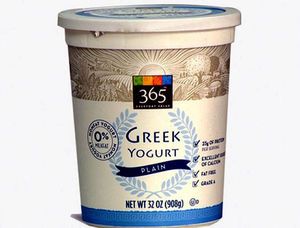Top Class Actions’s website and social media posts use affiliate links. If you make a purchase using such links, we may receive a commission, but it will not result in any additional charges to you. Please review our Affiliate Link Disclosure for more information.

The consolidated Greek yogurt class action lawsuit involves the sale of 0% and 2% Greek yogurt sold under the Whole Foods 365 Everyday Value store brand. The plaintiffs allege that the Whole Foods Greek yogurt contains significantly more sugar than what is listed on the product label.
The Greek yogurt labeling class action lawsuits were consolidated in Texas federal court in December 2014.
According to the court documents, Whole Foods pulled all of the allegedly mislabeled Greek yogurt products a few weeks after the first yogurt labeling class action lawsuit was filed. At a conference in June 2015, the court indicated that testing of the products would be critical to the litigation. Whole Foods responded that it had retained samples of the Greek yogurt that was at issue in the class action lawsuit.
“Unfortunately, it has recently been revealed that Whole Foods has utterly failed in its legal duty to preserve relevant evidence in its custody and control,” the plaintiffs’ attorneys state in their motion. They claim that in December 2015, “Whole Foods revealed to Plaintiffs for the first time that ‘Whole Foods does not possess retained samples of the Whole Foods Plain Greek Yogurt and believes the voluntarily withdrawn product was destroyed pursuant to Whole Foods protocol.’”
Further, Whole Foods also reported that Skotidakis, which manufactured the Greek yogurt for Whole Foods, also failed to preserve any samples of the product.
“Needless to say, the recent revelation that the entire stock of Yogurt from over 350 Whole Foods stores nationwide has simply disappeared has left Plaintiffs dumbfounded,” the attorneys state. They argue that Whole Foods has not provided any information about who authorized the destruction of the Greek yogurt products, “or if the retained samples were ever really preserved to begin with.”
The attorneys asked the court to order Whole Foods to provide details about the alleged destruction of evidence so it could be determine whether it was conducted in bad faith. They also asked the judge to bar Whole Food from contesting the adequacy of the plaintiffs’ independent testing of samples of the Greek Yogurt from Whole Foods store shelves. Those tests reportedly revealed the Greek yogurt products contained about six times the sugar content over what was stated on the label.
The plaintiffs are represented by Tina Wolfson of Ahdoot & Wolfson PC, William H. Anderson of Cuneo Gilbert & Laduca LLP, Stephen P. DeNittis of DeNittis Osefchen PC and Steve A. Gibbons of Law Office of Steve Gibbins.
The Whole Foods Greek Yogurt Class Action Lawsuit is In re: Whole Foods Market Inc., Greek Yogurt Marketing and Sales Practices Litigation, MDL No. 2588, in the U.S. District Court for the Western District of Texas.
UPDATE: On Mar. 25, 2016, Whole Foods fired back against allegations that it intentionally destroyed evidence in a consumer class action lawsuit involving claims it misrepresented the amount of sugar in its Greek yogurt.
UPDATE 2: On Sept. 1, 2016, Whole Foods opposed a sanctions request over destroyed Greek yogurt products, telling a federal court judge the grocery retaileris not to blame that the Class of consumer plaintiffs was not able to conduct testing on the 365 Everyday Value Greek yogurt products in question and that the case should be dismissed entirely.
ATTORNEY ADVERTISING
Top Class Actions is a Proud Member of the American Bar Association
LEGAL INFORMATION IS NOT LEGAL ADVICE
Top Class Actions Legal Statement
©2008 – 2024 Top Class Actions® LLC
Various Trademarks held by their respective owners
This website is not intended for viewing or usage by European Union citizens.















6 thoughts onWhole Foods Accused of Destroying Evidence in Greek Yogurt Class Action
UPDATE 2: On Sept. 1, 2016, Whole Foods opposed a sanctions request over destroyed Greek yogurt products, telling a federal court judge the grocery retailer is not to blame that the Class of consumer plaintiffs was not able to conduct testing on the 365 Everyday Value Greek yogurt products in question and that the case should be dismissed entirely.
add me to list
UPDATE: On Mar. 25, 2016, Whole Foods fired back against allegations that it intentionally destroyed evidence in a consumer class action lawsuit involving claims it misrepresented the amount of sugar in its Greek yogurt.
Please provide more information on how to file a claim in the Whole Foods Greek Yogurt case
Please provide information on how to file a claim in the Whole Foods Greek Yogurt case. Thank you. Robert Litwin robertlitwin10@yahoo.com
We need more places that can test our food to open up in every city. Everything should be tested regularly.